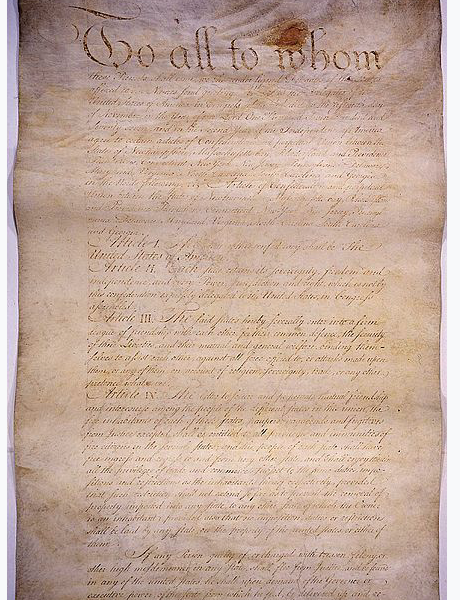
In 1861 a group of states declared their independence from the Federal Government and seceded from the Union. Among their grievances was an erosion of the sovereignty of the States to govern their own affairs and the fear that it would ultimately lead to the end of Slavery. They formed a Confederacy of States and fought a war of rebellion against the Federal government. They lost.
Less than a hundred years earlier, a group of States declared their independence and seceded from the Great Britain. Among their grievances was the passage of various acts of Parliament that caused an erosion of sovereignty of the States on this side of the ocean and their freedom to govern their own affairs. They fought a war of rebellion. They won.
And to form a government those rebels adopted, not the Constitution, but rather The Articles of Confederation. This First Confederacy, like the later one was also a failure.
Americans, after fighting the Revolution, and with their experience with the Crown were understandably suspicious of Governments with too much power. While they formed a Union of States, in their Articles of Confederation they took pains to preserve the power of the of the individual States and to insure not too much power was granted the new government.
Under the Articles of Confederation there was no Chief Executive. There was no independent Judiciary much less a Supreme Court. There was certainly no Supremacy clause. Nine states had their own Navies. There was no Commerce Clause. There was no common currency.
And the States pretty much wanted it that way.
At least they did until Shay’s Rebellion.
In Shay’s Rebellion, a group of Farmer’s engaged in their own act of insurrection. The Economy of the new country was in shambles. Farms were being foreclosed on. Farmers were being cast into debtor’s prison. So the farmers took up arms against the most visible and corrupt of their tormentors. They took over a number of local courts.
This was a problem for the new nation. There was no central authority with the power to put down the rebellion. A privately funded mercenary force had to be put together to quell the disturbance.
The inability to put down the rebellion gave impetus to the call for a strong central government. A convention was proposed. Ostensibly it would be used to revise and strengthened the Articles of Confederation. However, many Patriots, later called Anti-Federalists, had their suspicions. They suspected that a new centralized form of government with vast powers would be formed. Patrick Henry, one of the men who opposed having a convention, said he “smelt a rat.” He was right.
We had our Constitutional convention. The Articles of Confederation ended up in the waste bin. The rest is history.
The debates between Federalists (those who believed in a strong centralized government) and Anti-Federalists (those who believed the opposite and eventually became known as advocates of “States Rights”) had a significant influence on the structure of government under our Constitution. The Federal Government was to have only those powers specifically delegated to it by the People. All other powers were specifically reserved to the States and the People.
At least that’s the way they wrote it up. Despite the express wish of the framers of the Constitution, it cannot be gainsaid that the accretion of power to the Federal Government over the last century and the erosion of the power of the States has been steady and accelerating.
Ironically, given the recent events in Charlottesville, the incorporation of other safeguards against the dangers of centralized power like the Separation of Powers Doctrine and Checks and Balances, had as its source, what was called the Virginia Plan. It was named after the State that was home to Confederate General Robert E. Lee. Yes, that Lee. Lee, Commandant of West Point, who was offered the command of the Union Army, resigned after his beloved state seceded from the Union. He is now a figure the eternally bitter and insufferably self-righteous are rushing to vilify. But that’s another story.
What is clear is that the concerns over placing too much power in too few hands which led to the first attempt at Confederacy, no less a failure than the second attempt, has continued to be a recurring philosophical current in American political thought.